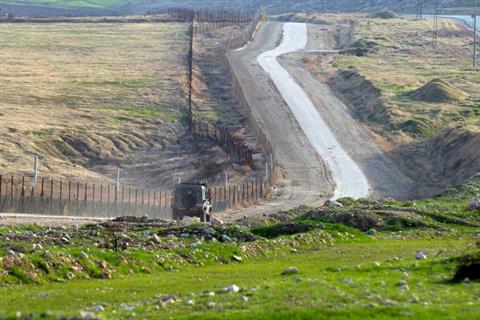
An Israeli army vehicle patrols the Israeli Jordanian border at the Israeli side of the Jordan valley January 1, 2014. Photo courtesy of Reuters.
In approximately one month, United States Secretary of State John Kerry’s deadline for negotiations will run out, and the results of the U.S. led Israeli-Palestinian peace talks will be exposed. One of the main issues being discussed revolves around border and security issues in the Jordan Valley. Washington Institute for Near East Policy director Robert Satloff and senior fellow and director of the Washington Institute’s Military and Security Studies Program Michael Eisenstadt clarify the details and offer some insight into the Jordan Valley debate in a policy analysis piece published on Feb. 24, 2014.
The article, “Clarifying the Security Arrangements Debate: Israeli Forces in the Jordan Valley,”describes both the Israeli and Palestinian position on the issue as basic principles. The Israelis want the Jordan River to remain their eastern security border. Israelis would maintain a military presence that would guard against terrorism and weapons smuggling and would serve as the first line of defense from threats that might emerge east of the river. While Israel welcomes security arrangements with Jordan and the Palestinians, Israel rejects the idea that international forces could replace its own troops. The Israelis will not agree to a time specific plan that would disregard the strategic realities on the ground.
But even amongst Israeli military leadership there are differences of opinion on the issue. Uzi Dayan, a former Israeli army commander who has led Israel’s Central Command and served as national security adviser twice, says Israel has a recognized right to borders it can defend, and says controlling the Jordan Valley is the only way Israel can secure its eastern border if the West Bank becomes a Palestinian state.
On the other hand, Meir Dagan, Israeli former Mossad leader for eight years after serving as a major general in the Israeli armed forces, says that the worry of an attack from the east is way overblown. “I have no problem with the political demand that the valley should be part of the State of Israel. What bothers me is that it’s being depicted as some sort of security problem.”
For the Palestinians, the principle is that the independence and sovereignty of their future state require the removal of all vestiges of Israel’s military occupation. Palestinian Authority leaders say they recognize the need for a transition period in which Israel would retain some military presence in the area, but there needs to be a deadline. PA President Mahmoud Abbas would welcome the deployment of international troops along the Jordan River as a way to ensure security to allay Israeli fears.
The Israeli newspaper Maariv reported on Friday that Kerry’s staff is exerting heavy pressure on Abbas to agree to the basis of security arrangements for the Jordan Valley. “For you it is a matter of national honor or political pressure,” Kerry’s staff told Abbas, “but for Netanyahu it is a matter of life and death.”
In order to resolve the disputes over the issue, the media must pay more attention to the facts on the ground. Satloff and Eisenstadt write, “Focusing on the details of Israel’s actual and prospective deployments along the Jordan River may provide a way to de escalate tensions on this issue and promote a more dispassionate public debate. Palestinians may take a different view if their leaders clarified that the question of Israel’s future military presence in the valley concerns a few hundred personnel, not the thousands that are often implied.”
Noting potential changes in regional dynamics could also move leaders toward a more pragmatic approach on this issue. “Regional experience could also be used to soften the debate’s edges. For example, it is not difficult to imagine that future developments in the region — especially the jarring potential for tumultuous change in Jordan — could cause the PA to welcome, not just endure, some external presence in the Jordan Valley.”
The Jordan Valley is just one area that has proven to be emotionally charged and complicated to solve in the negotiations. With both Netanyahu and then Abbas set to meet with US negotiators respectively in Washington in March, the pressure is on and stakes are high. Both leaders must adhere to Satloff and Eisenstadt’s call for fairness in the media and pragmatism in the decision room.